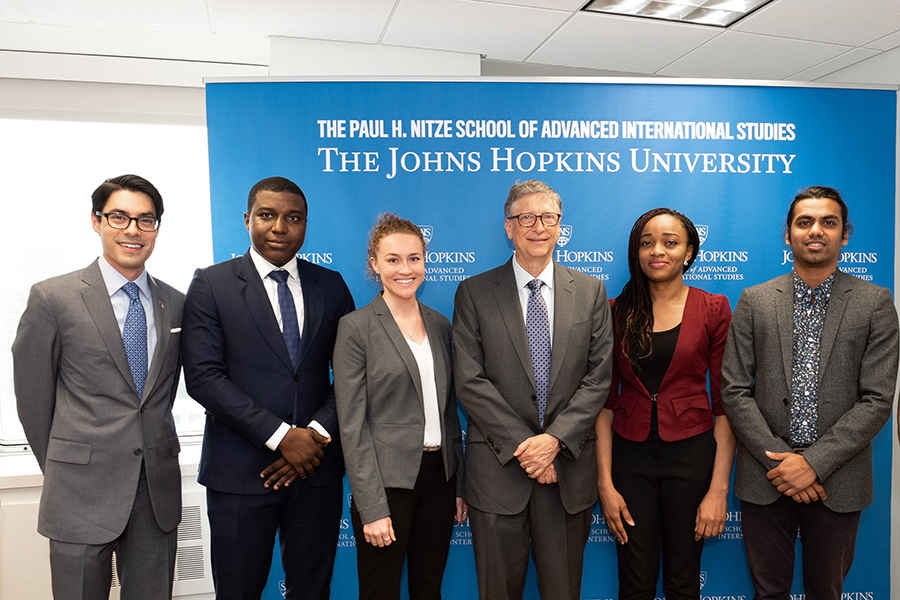Master of Arts in International Relations (MAIR)
Overview
As the world continues to change quickly, it is essential for leaders to understand how economics, geopolitics, security, and the environment are inextricably linked—exactly what you will learn as a student at Johns Hopkins SAIS.
Students can spend both years in Washington, D.C., or may spend their first year at the SAIS Europe campus in Bologna, Italy or at the Hopkins-Nanjing Center in Nanjing, China.
Become an Expert
We have reimagined the study of international relations and designed a bold new curriculum that allows you greater flexibility to focus on the issues that matter most to you. The Master of Arts in International Relations degree program will prepare you with the knowledge, skills, and experiences to tackle the complex global challenges of today—and tomorrow.
Core Curriculum
Build your expertise through a flexible and diverse curriculum, which includes core areas of study examining leadership, decision-making, data analytics, economics, geopolitics, and research methods. You will enroll in six courses (24 credits) within the following core areas:
- SAIS Seminar (first fall semester)
- Leadership, Ethics, and Decision-Making
- International Economics (2 courses)
- Data Analytics
- Research Methods
Focus Area
Self-design the curriculum based on your interests with the 10 remaining courses (40 credits). This allows you to gain further professional and substantive insights by developing an extensive global mindset through functional and regional focus areas. At a minimum, 12 credits must be taken within one functional area and 12 credits within one regional area.Functional
- Development, Climate, and Sustainability
- Governance, Politics, and Society
- International Economics and Finance
- Security, Strategy, and Statecraft
- Technology and Innovation
Capstones
Capstone courses represent the culmination of your academic experience at SAIS, building on the skills, experiences, and knowledge you’ve acquired to complete a substantial project or research paper, often with an experiential learning component. You will have the opportunity to choose from among the following options:- Practicums
- Courses in which students undertake a consulting project with an outside client organization. Students usually work in teams of four to deliver quality results to their client and may have the opportunity to travel.
- Study Trips
- Courses in which students travel during winter or spring break to enhance their understanding of a functional area or region of the world. Students then produce research papers or other final deliverables informed by their travel experiences.
- Project Courses
- Courses in which students plan and execute a competition, event, or staff ride for the larger SAIS community. Examples include the Seminar in Crisis Simulation and the International Staff Ride Leadership Seminar.
- Research Seminars
- Courses in which students produce a substantial research paper of publishable quality. Papers are usually 20-35 pages in length.
- Non-credit Research Papers
- Courses in which students expand a paper affiliated with a SAIS course to 20-25 pages or write a new academic work inspired by an internship experience.
Language Training
Open doors to new professional possibilities through the study of a language. Our robust language studies program, emphasizing current political and economic topics, trains you to achieve proficiency in a non-native language. Students must complete proficiency in a language outside of their native tongues.
Professional Skills Training
Learn through professional training that will prepare and guide you through your studies at SAIS and toward your future careers in the international affairs arena. Students complete a minimum of two non-credit, professional skills courses focusing on technical, leadership, problem-solving and professional content. Sample offerings include:- Public Speaking and Presentation
- Policy Writing
- Delivering Briefings
- Teamwork
- Negotiation
- Project Management
- Consulting
- Monitoring and Evaluation
- Data Analytics for Policy Analysts
- Financial Analysis
- Political Risk Analysis
- Geographic Information System (GIS)
- Intro to Python, R or STATA
- Excel III and IV
- Tableau




